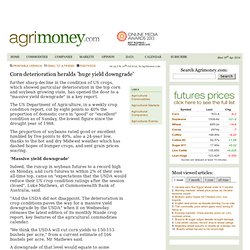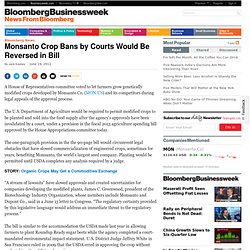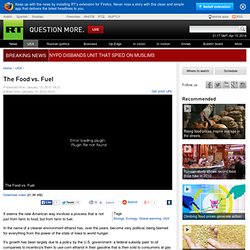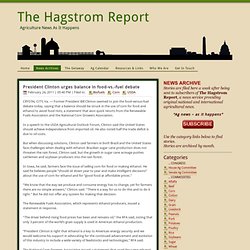

Erich Pica: A Bad Few Weeks for Big Biotech. It's been a bad few weeks for the biotechnology industry.

After decades of challenging Big Biotech's disastrous attempts to redesign and control our food supply and genetic commons, I can gladly say this is the first time in a long while that this largely unregulated industry has been on the defensive on so many different fronts. Glyphosate found in humans: Last week, our sister organization Friends of the Earth Europe released results of a groundbreaking new study which revealed that 44 percent of European city dwellers, from 18 countries, are contaminated with Monsanto's potentially-dangerous herbicide glyphosate, commonly known as Roundup -- and it is likely that Americans are being polluted at similar or higher levels given the widespread use of glyphosate in the United States. Glyphosate is used by farmers, local government and gardeners, and is sprayed extensively on genetically modified crops which have been engineered to be resistant to this herbicide.
Sick pigs on a GE diet: Corn deterioration heralds huge yield downgrade. Further sharp decline in the condition of US crops, which showed particular deterioration in the top corn and soybean growing state, has opened the door to a "massive yield downgrade" in a key report.

The US Department of Agriculture, in a weekly crop condition report, cut by eight points to 40% the proportion of domestic corn in "good" or "excellent" condition as of Sunday, the lowest figure since the drought year of 1988. The proportion of soybeans rated good or excellent tumbled by five points to 40%, also a 24-year low, thanks to the hot and dry Midwest weather which has dashed hopes of bumper crops, and sent grain prices soaring. 'Massive yield downgrade' Indeed, the run-up in soybean futures to a record high on Monday, and corn futures to within 2% of their own all-time top, came on "expectations that the USDA would reduce their US crop condition ratings after the session closed", Luke Mathews, at Commonwealth Bank of Australia, said.
"And the USDA did not disappoint. Monsanto Crop Bans by Courts Would Be Reversed in Bill. A House of Representatives committee voted to let farmers grow genetically modified crops developed by Monsanto Co.

(MON:US) and its competitors during legal appeals of the approval process. The U.S. Poet gets new partner in $250 million cellulosic ethanol plant in Iowa. By Leslie Brooks Suzukamolsuzukamo@pioneerpress.com Posted: 01/23/2012 12:01:00 AM CST | Updated: 2 years ago Poet LLC, a Sioux Falls, S.D. ethanol giant with several plants in Minnesota, today announced a joint venture with a Dutch biotech company to build a $250 million ethanol plant that it hopes will pave the way for the next generation of renewable biofuels.

Poet, one of the world's largest ethanol makers, is partnering with Royal DSM to build a 25-million-gallon cellulosic ethanol plant in Emmetsburg, Iowa. The plant would be erected adjacent to Poet's existing corn ethanol plant with production scheduled for the latter half of 2013. Cellulosic ethanol is made from agricultural waste such as corn stover, thus eliminating the "food vs. fuel" controversy over corn ethanol. Poet CEO Jeff Broin said the partnership with Royal DSM means that Poet will no longer need a $105 million federal loan guarantee it received from the U.S. Food vs fuel a fallacy, says NCGA board member on barnstorming tour. The Food vs. Fuel. Published time: January 13, 2012 18:21 Edited time: January 13, 2012 22:21 It seems the new American way involves a process that is not just from farm to food, but from farm to fuel.

In the name of a cleaner environment ethanol has, over the years, become very political, being blamed for everything from the power of the state of Iowa to world hunger. It’s growth has been largely due to a policy by the U.S. government- a federal subsidy paid to oil companies to incentivize them to use corn ethanol in their gasoline that is then sold to consumers at gas stations across the country. It lasted 33 years and cost more than 20 billion dollars. Sen. President Clinton urges balance in food-vs.-fuel debate. February 24, 2011 | 05:40 PM | Filed in: Biofuels Corn USDA CRYSTAL CITY, Va. — Former President Bill Clinton seemed to join the food-versus-fuel debate today, saying that a balance should be struck in the use of corn for food and ethanol to avoid food riots, a statement that won quick retorts from the Renewable Fuels Association and the National Corn Growers Association.

In a speech to the USDA Agricultural Outlook Forum, Clinton said the United States should achieve independence from imported oil. He also noted half the trade deficit is due to oil costs. But when discussing solutions, Clinton said farmers in both Brazil and the United States face challenges when dealing with ethanol. Brazilian sugar cane production does not threaten the rain forest, Clinton said, but the growth in sugar cane acreage pushes cattlemen and soybean producers into the rain forest.